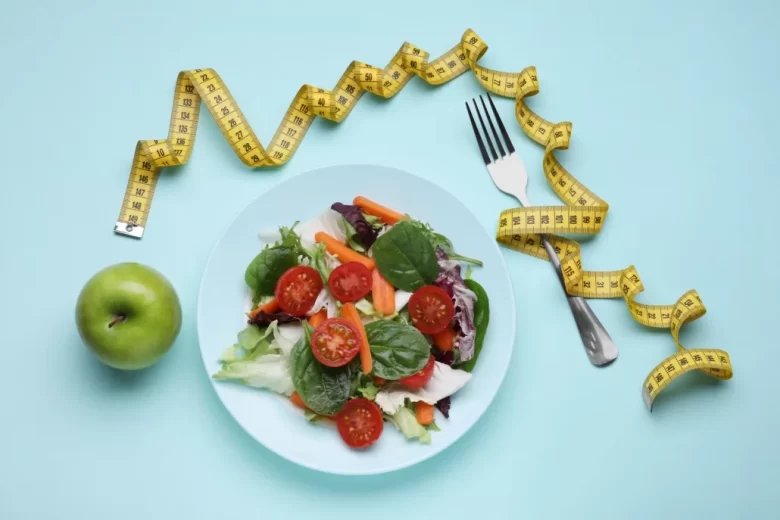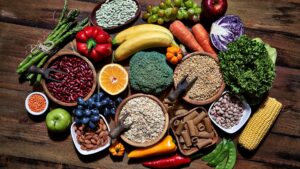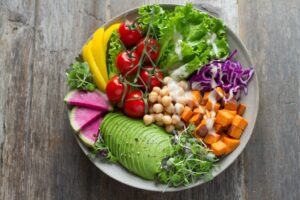Diets designed to aid weight loss while simultaneously improving overall health and lowering disease risks can have profound benefits, from decreasing inflammation-causing foods to emphasising nutritious fruits, veggies and healthy fats. They also emphasise high-fibre foods to support digestive health and lower cholesterol levels, along with reduced sodium and sugar intake.
1. Plant-Based Diet
A plant-based diet emphasises fruits, vegetables, whole grains, legumes (beans and peas), and unsalted nuts and seeds, as well as healthy fats like olive oil, as staples in its nutrition plan. Meat, dairy products, fish or poultry should be limited or avoided altogether.
Patients suffering from chronic health conditions such as heart disease and high blood pressure or cholesterol levels can use a well-planned plant-based diet to ease symptoms and decrease medication needs. When making this transition, it is wise to consult a registered dietitian and ensure all necessary nutrients (protein, B12, calcium and iron) are consumed in sufficient amounts.
Plant-based diets include vegetarian or vegan lifestyles, semi-vegetarian or flexitarian options and semi-flexitarian options. A vegetarian diet typically entails including eggs and dairy while forgoing all meat, while veganism excludes all food containing animal products. Eating plant-based foods may be especially helpful to patients living with diabetes due to their lower glycaemic index ratings which help manage blood sugar levels more effectively; in addition, unrefined carbohydrates found in plant foods have been shown to improve insulin sensitivity, thus decreasing medication usage.
2. Mediterranean-Style Diet
The Mediterranean diet, which is based on eating habits found among people living around the Mediterranean Sea, has been shown to significantly lower risks of heart disease and other major conditions. This diet emphasises fruits, vegetables, whole grains, nuts, lean meats and olive oil over red meat, processed food and sweets.
Diets that promote health include those rich in monounsaturated fats that help prevent blood clots and lower cholesterol levels; fibre is also an integral component, slowing digestion while helping control blood sugar. Finally, plant-based protein sources like beans or legumes (like lentils, black beans and chickpeas) should also be included as protein sources in any healthy diet plan.
Assimilate three servings of fruits and veggies daily and at least three servings of whole grains. Include fish several times every week in your meals, use extra-virgin olive oil instead of other cooking oils, add spices and herbs for flavour, and avoid processed cheeses for low-fat Greek yoghurt and other non-dairy options as alternatives to help cut back calories and promote weight loss.
3. Vegetarian Diet
Eating vegetarian can help you shed unwanted weight by providing lower calories and more fibre intake, along with being heart-healthy by potentially improving cholesterol levels and helping the environment by decreasing animal needs, thus decreasing greenhouse gases in the atmosphere.
To maximise health benefits, select whole grain foods while limiting processed and added sugar foods. A vegetarian diet provides ample sources of protein from beans, tofu, quinoa and chia seeds – try substituting one meatless meal per week by switching up meals like Meatless Monday or dinner for soup or pasta with vegetables instead.
Prior to making major dietary changes, it is wise to consult your doctor. Some may find it challenging to meet their nutrient needs without eating animal products, particularly pregnant or breastfeeding mothers. Vegetarian eaters may need additional sources of omega-3 fatty acids, iron and vitamin B12. Fortified foods and some supplements offer these essential elements, so if you are thinking of becoming vegetarian, contact both your physician and registered dietitian to learn more.
4. Flexitarian Diet
Flexitarianism is an excellent solution for anyone who is interested in cutting back on meat consumption while still enjoying all of the advantages associated with eating more plant-based meals and ranks highly in 2022’s Best Diets rankings for long-term health and disease prevention.
Under a flexitarian plan, eaters replace meat with plant-based proteins like beans and legumes, whole grains, nuts, and seeds to achieve balanced nutrition and stave off hunger. A diet high in fibre also improves digestive health while helping prevent constipation.
Beginner flexitarian eaters usually adhere to a two-day meatless week and limit themselves to no more than 26 oz of meat per week (a card deck weighs 3 oz). At the advanced flexitarian level, however, this number drops down to three while increasing meat consumption to 9 oz per day.
Before beginning their flexitarian lifestyle, those unfamiliar should seek advice from a registered dietitian. It is essential that they are mindful of nutrient deficiencies such as protein, iron, zinc and vitamin B12. Supplementation may be necessary depending on individual circumstances.
5. Fasting
While diets come and go–Kellogg’s Special K and the Sexy Pineapple Diet weren’t particularly popular–intermittent fasting has remained on our radar for nearly 10 years. It appears to provide an effective alternative to counting calories, especially if those calories consumed are nutritious ones.
Intermittent fasting refers to various eating patterns that involve intermittently restricting calorie consumption on some days while eating regularly on others. Three common options for intermittent fasting include time-restricted eating (16:8 diet), alternate-day fasting (5:2), and timed fasting.
Time-restricted eating plans involve choosing a fixed window of time each day when to eat, typically an eight-hour window but sometimes six or four. Within that eating window, people typically select whole food instead of processed or sugary foods and may include healthy fats such as avocado or nuts as healthy choices. When engaging in intermittent fasting plans, it is also essential that they remain well hydrated by drinking plenty of water or other calorie-free beverages during fasting periods to stay hydrated and stay hydrated with water alone or other non-caloric beverages during fasting periods to stay hydrated and stay hydrated during any fasting periods to remain hydrated and stay hydrated during any fasting periods if doing an intermittent fast is conducted.




